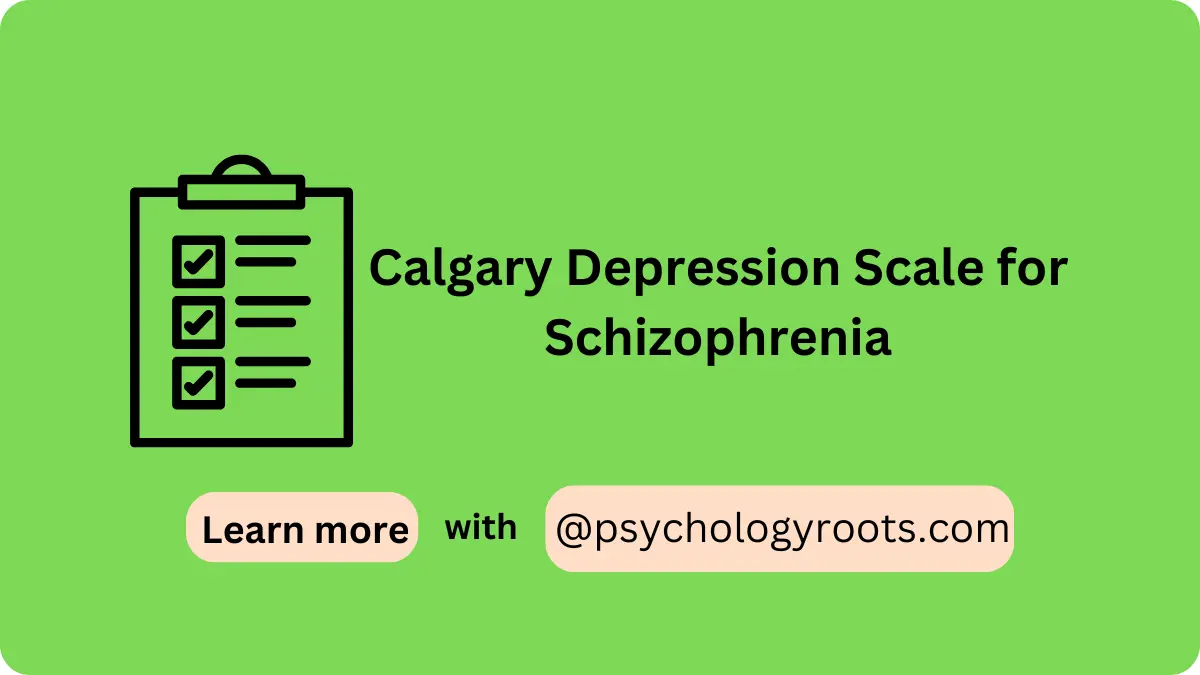Table of Contents
Calgary Depression Scale for Schizophrenia
Here in this post, we are sharing the “Calgary Depression Scale for Schizophrenia”. You can read psychometric and Author information. We have thousands of Scales and questionnaires in our collection (See Scales and Questionnaires). You can demand us any scale and questionnaires related to psychology through our community, and we will provide you with a short time. Keep visiting Psychology Roots.
About Calgary Depression Scale for Schizophrenia
Scale Name
Calgary Depression Scale for Schizophrenia
Author Details
Donald Addington, Jean Addington, and Eleanor Maticka-Tyndale
Translation Availability
English

Background/Description
The Calgary Depression Scale for Schizophrenia (CDSS) is a clinician-administered, semi-structured interview tool specifically designed to assess depressive symptoms in individuals with schizophrenia, distinguishing them from negative symptoms and extrapyramidal side effects of antipsychotics. Developed in 1993 by Donald Addington, Jean Addington, and Eleanor Maticka-Tyndale, the CDSS addressed the challenge of accurately identifying depression in schizophrenia, where overlapping symptoms like apathy or motor slowing could confound diagnosis. Its creation was driven by the need for a reliable, targeted measure to support clinical management and research in this population.
The CDSS consists of nine items, each rated on a 4-point scale (0 = “absent” to 3 = “severe”), covering depressive symptoms such as depressed mood, hopelessness, self-depreciation, guilty ideas of reference, pathological guilt, morning depression, early wakening, suicide, and observed depression. Total scores range from 0 to 27, with higher scores indicating greater depressive severity; a score above 6 often suggests clinically significant depression. The scale’s design, based on patient self-reports and clinician observations, ensures sensitivity to depressive phenomenology while minimizing contamination from schizophrenia’s negative symptoms or medication effects.
Psychologists, psychiatrists, and researchers value the CDSS for its specificity and brevity, making it ideal for routine use in schizophrenia management. It supports differential diagnosis, treatment planning (e.g., antidepressants, psychotherapy), and outcome evaluation in clinical trials. Its translations into multiple languages enhance its global applicability, enabling clinicians to address depression in schizophrenia with precision and empathy across diverse populations.
Administration, Scoring and Interpretation
- Obtain a copy of the Calgary Depression Scale for Schizophrenia from a reputable source, such as peer-reviewed journals, authorized research platforms, or the University of Calgary’s psychiatry resources, ensuring proper use permissions.
- Explain the purpose of the CDSS to the patient, noting that it assesses depressive symptoms to guide treatment, emphasizing its focus on their emotional experiences.
- Provide instructions, guiding the clinician to conduct a semi-structured interview, asking standardized questions for each of the nine items and rating responses based on the patient’s self-report and observed behavior over the past two weeks.
- Approximate time for completion is about 10-15 minutes, depending on the patient’s responsiveness and the clinician’s experience.
- Administer the scale in a private, quiet setting, ensuring the patient feels comfortable to discuss sensitive topics like mood and suicidal thoughts.
Reliability and Validity
The Calgary Depression Scale for Schizophrenia exhibits robust psychometric properties, as established by Addington et al. (1993) and subsequent research. Internal consistency is high, with Cronbach’s alpha values of 0.76-0.86, indicating good item cohesion. Inter-rater reliability is excellent, with intraclass correlation coefficients of 0.86-0.93 among trained clinicians, reflecting consistent scoring. Test-retest reliability is strong, with correlations of 0.80-0.89 over short intervals in stable populations.
Convergent validity is evidenced by strong correlations with other depression measures, such as the Hamilton Depression Rating Scale (r = 0.70-0.82) and the Beck Depression Inventory (r = 0.65-0.75). Discriminant validity is a key strength, with weak correlations to negative symptom scales like the Positive and Negative Syndrome Scale (PANSS) negative subscale (r < 0.30) and extrapyramidal symptom measures (r < 0.25), ensuring specificity to depression. Criterion validity is demonstrated by its ability to differentiate depressed from non-depressed schizophrenia patients and its sensitivity to treatment effects, such as reduced scores post-antidepressant therapy. These qualities affirm the CDSS’s precision and utility.
Available Versions
09-Items
Reference
Addington, D., Addington, J., & Maticka-Tyndale, E. (1993). Assessing depression in schizophrenia: the Calgary Depression Scale. The British journal of psychiatry, 163(S22), 39-44.
Important Link
Scale File:
Frequently Asked Questions
What does the CDSS measure?
It measures depressive symptoms in individuals with schizophrenia.
Who administers the CDSS?
Trained clinicians, such as psychiatrists or psychologists, administer it.
How long does the CDSS take to complete?
It takes about 10-15 minutes.
Does the CDSS distinguish depression from negative symptoms?
Yes, it’s designed to minimize overlap with negative symptoms or side effects.
Can the CDSS track treatment outcomes?
Yes, it’s sensitive to changes from antidepressants or therapy.
Disclaimer
Please note that Psychology Roots does not have the right to grant permission for the use of any psychological scales or assessments listed on its website. To use any scale or assessment, you must obtain permission directly from the author or translator of the tool. Psychology Roots provides information about various tools and their administration procedures, but it is your responsibility to obtain proper permissions before using any scale or assessment. If you need further information about an author’s contact details, please submit a query to the Psychology Roots team.
Help Us Improve This Article
Have you discovered an inaccuracy? We put out great effort to give accurate and scientifically trustworthy information to our readers. Please notify us if you discover any typographical or grammatical errors.
Make a comment. We acknowledge and appreciate your efforts.
Share With Us
If you have any scale or any material related to psychology kindly share it with us at psychologyroots@gmail.com. We help others on behalf of you.